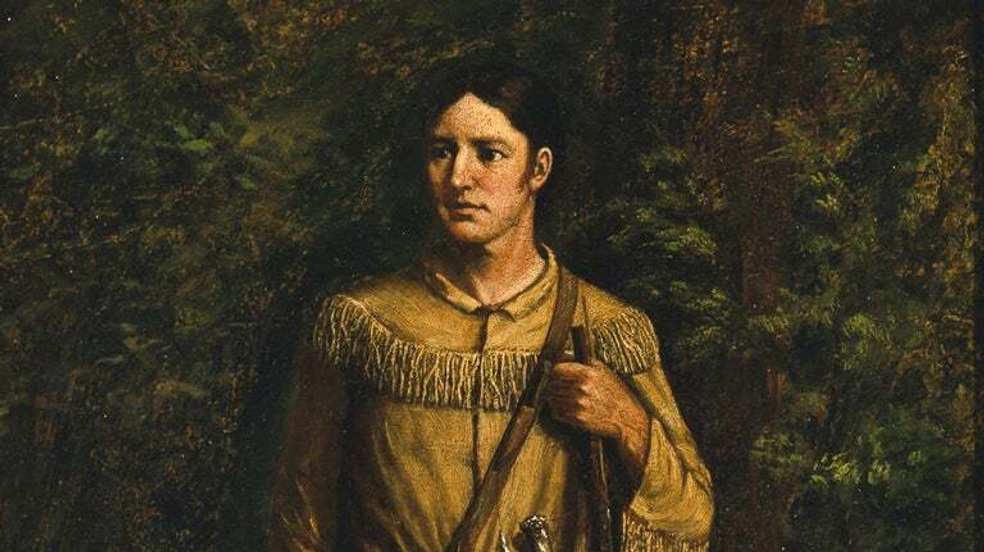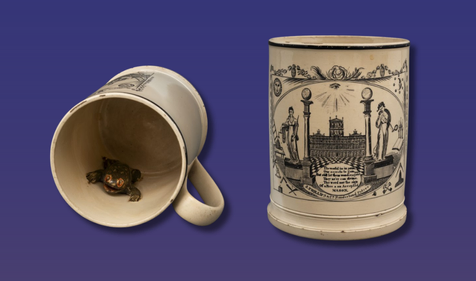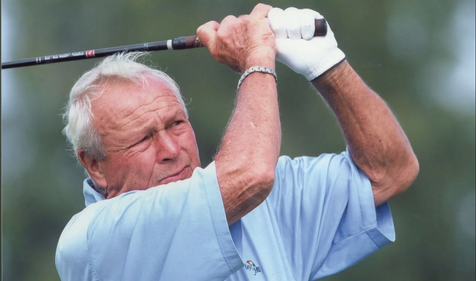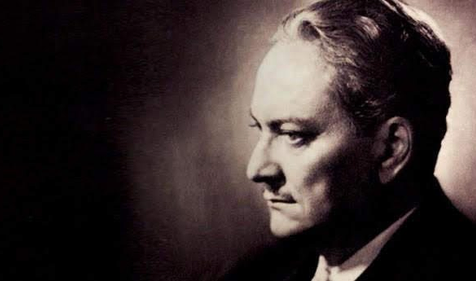Davy Crockett was a Freemason, frontiersman, politician, and American folk hero. In our blog, we explore his life in and outside of Freemasonry.
In the vast tapestry of American history, few figures stand as tall and enduring as Davy Crockett—a frontiersman, politician, Freemason, and hero of the Battle of the Alamo. His life's journey weaves through the untamed landscapes of the early 19th-century United States, leaving an indelible mark on the nation's narrative.
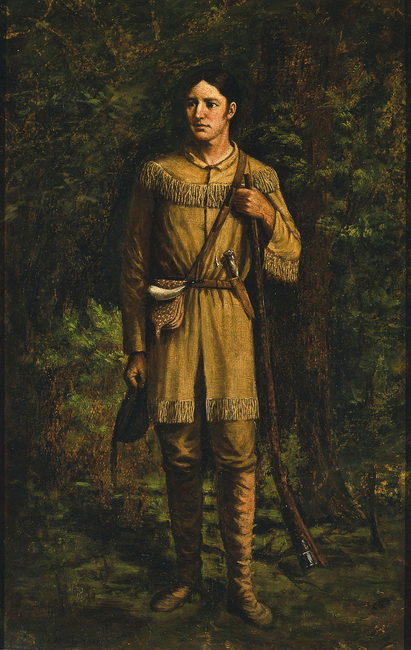
A Child of the Tennessee Wilderness
The Crockett lineage traces back to French Huguenots who settled in America during the early 1700s. Brother Crockett's father, John, was born in 1753 in Frederick County, Virginia before his parents moved the family to Tryon County, North Carolina. Around 1768, John became a frontiersman and served with the Overmountain Men during the American Revolutionary War.
In 1780, John married Rebecca Hawkins. The couple welcomed son David Crockett into the world on August 17, 1786, in a rugged frontier cabin in what is now Greene County, Tennessee. John's financial troubles were nearly constant throughout his life, and he moved the family many times during Brother Crockett’s childhood. First, he relocated to a tract of land on Lick Creek, Tennessee, then to Cove Creek, Tennessee, where he built a gristmill. After a flood destroyed the gristmill and the Crockett homestead, John moved the family again, this time to Mossy Creek in Jefferson County, Tennessee, until bankruptcy forced him to relinquish his property in 1795.
By 1798, John built a tavern along a stagecoach route in Morristown in the Southwest Territory. His debts never ceased, and John indentured a 12-year-old Brother Crockett to a man named Jacob Siler. He tended Siler's cattle on a 400-mile trip to Natural Bridge in Virginia and was paid and treated reasonably.
When he returned home, his father enrolled him in school, although it was short-lived. In his autobiography, Brother Crockett wrote, "I went four days and had just begun to learn my letters a little when I had an unfortunate falling out with one of the scholars—a boy much larger and older than myself." After a fight with his bully, his father tried to punish him, only for Brother Crockett to flee his home.
Family and Frontier Life
Brother Crockett's education was destined to be gained from life experience rather than the classroom. He left Tennessee and roamed the countryside over the next few years, working odd jobs as a teamster, farmhand, and hat maker's apprentice while earning a reputation as a skilled hunter. His encounters with Native American tribes further enriched his understanding of the land and its inhabitants. He wrote that when he finally returned home in 1802, he had "been gone so long, and had grown so much, that the family did not at first know me."
A few years after Brother Crockett's return home, he married Polly Finley on August 12, 1806. Together, they had three children: John Wesley Crockett, William Finley Crockett, and Margaret Finley Crockett. The Crocketts then moved to Franklin County in 1813, where Polly died in March 1815. Brother Crockett then married the widow Elizabeth Patton, who had two children from a previous marriage. They had three more children: Robert, Rebecca, and Matilda.
As the Creek War raged in 1813, Brother Crockett enlisted for a three-month stint as a scout for the Tennessee Militia. He served with Francis Jones's Company of Mounted Rifleman, using his skills as a frontiersman to hunt wild game for the soldiers. After his service with the state militia ended, he re-enlisted and served with Andrew Jackson on his campaign in Spanish Florida.
Political Ascent
During his military career, Brother Crockett's hunting skills were quickly becoming the “stuff of legends”. For example, he stalked black bears, once hunting more than 100 of them in the woods of Tennessee during the winter of 1825. His larger-than-life persona began to take shape, capturing the imaginations of those who crossed paths with the young frontiersman.
As the American wilds transformed into settled territories, Brother Crockett's ambitions shifted towards a different frontier—the world of politics. After his family settled in Lawrence County, he entered public office as a county commissioner. He became known as a successful businessman, and the local electorate appreciated how he handled his political duties. He was appointed the county justice of the peace and elected to serve as lieutenant colonel of the Fifty-seventh Regiment of Tennessee Militia.
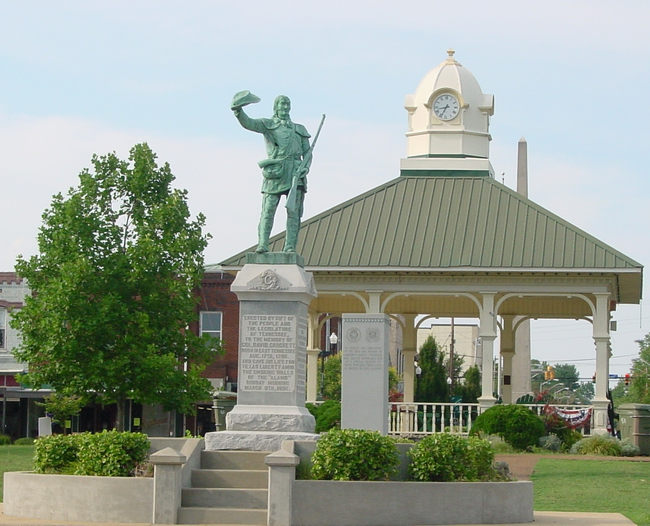
In 1821, he won a seat in the Tennessee General Assembly representing Lawrence and Hickman counties. Brother Crockett's unorthodox style, marked by folksy wit and plainspoken honesty, endeared him to many constituents. He became known for speeches that included incredible tales of his adventures on the frontier. With the true heart of a Freemason, he fought for those least fortunate while serving on the Committee of Propositions and Grievances. He aimed to help the poor by easing taxes on the lower class, a policy that clashed with his party's leader, Andrew Jackson.
Brother Crockett won a second term in the General Assembly and then set his sights on a bigger goal: to serve in the U.S. House of Representatives. His initial campaigns didn't earn him a seat, but ever committed to his mission, he ran again and won easily in 1826. As a congressman, he butted heads constantly with President Andrew Jackson, most notably regarding Jackson's proposed Indian Removal Act which forcibly removed Native Americans from their lands. Brother Crockett wrote of the act in his autobiography A Narrative of the Life of David Crockett:
"I believed it was a wicked, unjust measure... I voted against this Indian bill, and my conscience yet tells me that I gave a good honest vote and one that I believe will not make me ashamed on the day of judgment."
Cherokee Chief John Ross sent a letter to Brother Crockett expressing his gratitude, but his stance was deeply unpopular in Tennessee. Crockett was defeated in the following election and lost his seat in Congress.
While he was criticized for his position at the time, this episode only added to the mythology of Brother Davy Crockett. His enduring appeal lies not only in his historical significance but also in the resonance of his character with individuals across time. His journey from the Tennessee wilderness to the halls of Congress speaks to the American values of resilience, tenacity, and the pursuit of one's convictions.
Freemasonry and Brotherhood
Freemasonry provides a haven for men of diverse backgrounds to unite in mutual respect and values. Therefore, it is no surprise that in addition to his political pursuits, Brother Crockett found a place in Freemasonry. Initiated into the fraternity while serving in the House of Representatives, he embraced our fraternity’s brotherhood, morality, and values. While the exact details of when he joined are unclear, his Masonic Apron, made for him by Mrs. A.C. Massie of Washington, D.C., is proof of his membership.
After his political career, Brother Crockett entrusted the apron to the sheriff of Weakley County, Tennessee. It was inherited and preserved by the sheriff's nephew, E.M. Taylor of Paducah, Kentucky. The lodge in Weakley County, near the Crockett home, burned during the Civil War, destroying all of the lodge’s records.
The Legacy of a Revolutionary
One of the defining chapters in Brother Crockett's life unfolded on the dusty grounds of the Alamo in 1836. After Brother Crockett had eked out one final term in office from 1833 to 1835, he lost re-election and decided to close the book on his political career. He moved west along with a 30-man armed brigade, making way for Texas amid the Texas War for Independence.
Brother Crockett took up the cause of the Provisional Government of Texas and arrived in San Antonio at the Alamo Mission in February. Mexican President General Santa Anna and his thousands of troops moved in at the same time and began their siege of the fortress. The Mexican army lambasted the grounds of the Mission with a near-constant artillery bombardment for two weeks. Despite the limited powder stores and shots inside the Alamo, the Texan forces encouraged Brother Crockett and his men to continue firing on the enemy, as their sharpshooting skills were highly effective.
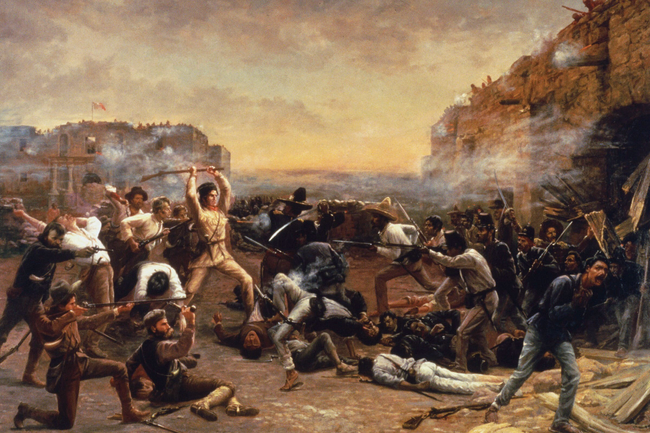
When the Battle of the Alamo finally came, it only lasted an hour and a half. Nevertheless, Crockett's presence came to symbolize the resilience and determination of those who stood against overwhelming odds. 200 Texas volunteer soldiers held off the Mexican Army for 13 days until they were overrun. The Battle of the Alamo became a rallying cry for independence, with Brother Crockett's name forever etched in the annals of American heroism.
The Legend of Davy Crockett
Brother Davy Crockett's legacy extends far beyond the confines of his lifetime. The folklore surrounding his adventures in the untamed wilderness, his larger-than-life persona, and his heroic stand at the Alamo have woven themselves into the fabric of American mythology. Tall tales and anecdotes about Brother Crockett's exploits circulated widely, turning him into a legendary figure even before his tragic end in Texas.
More than anything, Brother Crockett's extraordinary life is a testament to the indomitable spirit of the American frontier—a tale of a boy born in the wilderness who ventured into uncharted territories, both in the political arena and on the battlefield. From his humble beginnings in the Tennessee backwoods to the hallowed grounds of the Alamo, Crockett's legacy endures as a symbol of courage, tenacity, and the unwavering pursuit of freedom. In every chapter of his life, he embodied the spirit of a nation forging its identity in the crucible of history.
Related Stories
Discover additional Scottish Rite blogs and news on this topic.
-
A Jolly Masonic Mug
History
Read More about A Jolly Masonic Mug
-
The Life and Career of Brother Arnold Palmer
Famous Masons
Read More about The Life and Career of Brother Arnold Palmer
-
Manly P. Hall: Philosopher, Mystic, and Freemason
Famous Masons
Read More about Manly P. Hall: Philosopher, Mystic, and Freemason
